最新xx省xx市xx中学初中七年级英语上册教案:unit 4《my day reading》1(牛津
七年级英语上册 Unit 4 My day Task教案 (新版)牛津版

Unit 4 My dayTaskI. Teaching aims and learning objectivesBy the end of the lesson, students should be able to:1. understand the meaning of the happiness chart;2. complete Millie’s diary with the information about her likes and dislikes inthe table;3. write about their own likes and dislikes.II. Teaching contents1. New words and phrases: dislike, reason, ready, get ready for sth, learn, world2. New structure: They help us get ready for the day.I can learn a lot about the world.III. Focus of the lesson and predicted area of difficultyDiscuss the students’ own likes and dislikes and write them down.IV. Teaching proceduresStep 1 Preparation1. Present “love”, “like” and “dislike”T: Hello, boys and girls. Today we are going to learn about Task of Unit 4My day.In thisperiod, you need to learn to write about your day at school and your likes and dislikes.(1)_Explanation.Tell students that smiling faces stand for likes and dislikes. Ask thestudents about their likes and dislike. Help students give reasons of theirlikes and dislikes.T: When we talk about our likes and dislikes, we can also use these three pictures. We use the laughing face for “love”. We use the smiling facefor “like”. And we use the crying face for “dislike”.(出示单词love,like和dislike)T: “Love”means “like something very much”or “the thing you like very much”. So, what does “dislike” mean?T: Yes, you’re so clever. “dis-” means “not”. So “dislike” means “don’t like something” or “the thing you don’t like”.(2) Exercise.T: Can you complete the two sentences?Daniel ____________ (like) basketball. He never plays it.Aren’t you happy with the plan? Tell me what your ____________ (like) are. T: Good! In sentence one, “dislike”is a verb. It means “doesn’t like”.In sentence two, “dislike” is a noun. It means “the things you don’tlike”.2. Talk about the preparations before class(1) Explanation.T: Now, let’s talk about our days at school and our likes and dislikes. We do a lot of thingsat school every day. For example, before the first class begins in the morning, we do themorning reading and then morning exercises. Do you like them?S: I like morning reading.T: Oh, that’s good. Can you tell me why?S: Because it can help me remember things well.T: Yes, I agree. Reading aloud can help us a lot. What about morning exercises?S: I don’t like them.T: Oh, really? You dislike morning exercises. But why? I think they are good for us. They can help us get ready for the day.(出示词组get ready for)Oh, it’s a new phrase. Let’s read it together.(2) Exercise.T: Now, please complete the sentence.(出示练习句)They are all ____________ the test.3. Talk about different subjects at school(1) Make a dialogue.T: Every day, we have different lessons. What subject do you like or dislike? And why? (出示各门学科教科书的图片) Different people have different ideas. We havedifferent reasons for our likes and dislikes.(出示单词reason,词组the reasonfor…,句子We have different reasons for our likes and dislikes.)Now, boysand girls, please talk in pairs about the subjects you like and dislike inthis way.A: What subject do you like?B: I like/love…A: Why do you like it?B: Because I think…A: What subject do you dislike?B: I don’t like…A: Why don’t you like it?B: Because… What about you?A: I like… because… And I dislike… because…(2) Sum up.T: Very good. All of you did a good job. I find some good sentences in your conversations. Let me show you some of them. These useful expressions mayhelp you in your writing later.I like/love… becauseIt is interesting/useful/important/...I am interested in…I think it is important for us to learn… well.I like our… teacher. He/She is always…I don’t like… becauseIt is too difficult for me.I am not good at…There is always too much homework.T: I think every subject is very useful. We should try our best to learn them well. Do you agree?4. Talk about after-school activitiesT: After all the lessons finish in the afternoon, we always do different activities, such as basketball, badminton, volleyball, drawing, singing, dancing, reading and many other interesting activities. What are your likes and dislikes?T: Please group yourselves into teams of our. Tell your team members about activities you like and dislike. You can say it in this way.I like… because… I always/usually/often…I don’t like… because… I never/seldom…T: Yes, everybody has his own interest and hobbies. As for me, I dislike basketball because I’m not tall enough. And I like reading best because I can learn a lot about the world from books.) (出示词组learn a lot about the world)T: Here, we have two new words. Let’s read them. Can you use the new phrase to complete thesentence? (出示练习句)These days, I’m reading books about animals because I want ____ different animals ______.T: Now, let me show you some useful expressions for talking about after-school activities that we like and dislike.(出示谈论对于课外活动的喜恶时可以用到的词句)run fastjump highhave a sweet voicelearn a lot about the worldhelp me grow tall/strong/…I always enjoy myself when I…【设计意图】引导学生谈论对课外活动的喜、恶,教师在讲述自己的喜恶时自然引出本课时的新词汇;最后展示刚才谈论中涉及或未涉及的一些有用的词句,帮助学生积累写作环节组织语言需要的素材。
Unit 4 My day Grammar 示范课教学设计(牛津译林版七年级上册教案)

运用表示时间的介词和频率副词介绍自己的校园生活。
五、教学活动设计
环节一:观看视频,激活已知,导入本节课语法点——表示时间的介词。(3 mins)
教师首先创设情境,播放视频,引导学生观看视频并回答问题。
教学活动
1. Students watch the video and answer the question.
14. Students circle the right words and work out the rule.
活动层次学习理解ຫໍສະໝຸດ 感知与注意、获取与梳理、概括与整合
效果评价
从学生完成活动的情况,判断其对频率副词的掌握情况。
环节设计意图:引导学生在语境中识别并理解频率副词的基本用法和表意功能。
环节四:巩固新知,并在此基础进行迁移创新。(12 mins)
教师引导学生联系实际,进行想象和创造活动,巩固对频率副词及时间介词的用法。
教学活动
15. Studentsmake new conversations.
活动层次
迁移创新之想象与创造
效果评价
观察学生在描述校园生活时是否能够准确运用所学语言知识,根据情况给予必要的指导和反馈。
环节设计意图:引导学生在语境中联系实际,进行想象和创造活动,学会用所学知识做事。
7. Students look at the pictures and fill in the form.
8. Students observe the words and work out the rule.
9. Students play a game.
10. Students read the email and fill in the blanks.
七年级英语上册 Unit 4 My Day 教案
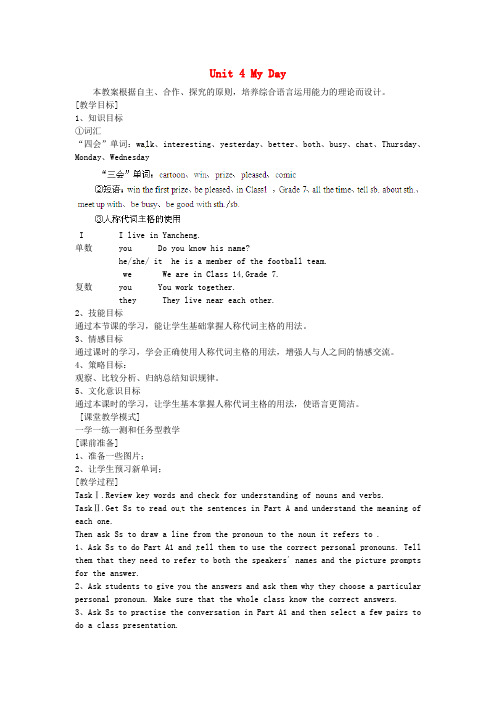
Unit 4 My Day本教案根据自主、合作、探究的原则,培养综合语言运用能力的理论而设计。
[教学目标]1、知识目标①词汇“四会”单词:walk、interesting、yesterday、better、both、busy、chat、Thursday、Monday、WednesdayI I live in Yancheng.单数 you Do you know his name?he/she/ it he is a member of the football team.we We are in Class 14,Grade 7.复数 you You work together.they They live near each other.2、技能目标通过本节课的学习,能让学生基础掌握人称代词主格的用法。
3、情感目标通过课时的学习,学会正确使用人称代词主格的用法,增强人与人之间的情感交流。
4、策略目标:观察、比较分析、归纳总结知识规律。
5、文化意识目标通过本课时的学习,让学生基本掌握人称代词主格的用法,使语言更简洁。
[课堂教学模式]一学一练一测和任务型教学[课前准备]1、准备一些图片;2、让学生预习新单词;[教学过程]TaskⅠ.Review key words and check for understanding of nouns and verbs.TaskⅡ.Get Ss to read ou t the sentences in Part A and understand the meaning of each one.Then ask Ss to draw a line from the pronoun to the noun it refers to .1、Ask Ss to do Part A1 and tell them to use the correct personal pronouns. Tell them that they need to refer to bo th the speakers´ names and the picture prompts for the answer.2、Ask students to give you the answers and ask them why they choose a particular personal pronoun. Make sure that the whole class know the correct answers.3、Ask Ss to practise the conversation in Part A1 and then select a few pairs to do a class presentation.TaskⅢ. Ask Ss to look at the sentences in Part A2 and to complete the sentences on their own. Then check answers with the whole class.TaskⅣ. Ss read the article in Part A3 for general understand only. Give a quick explaination of any words they do not know. Ask Ss to complete the task on their own. Then read the article to the class. Try to deal with all the problems after reading the article in order to maintain the students’ int erest.TaskⅤ. Extension activityAsk students to u nderline all the personal pronouns(subject form)in the reading passase on page20.TaskⅥ. Practice—Task. 课堂教学任务目的:比较熟练掌握人称代词主格的用法材料:挂图语言技能:Peading and speaking活动形式:Groupwork/Pairwork操作过程:①两人一组到前面表演②分小组形式进行讨论。
七年级英语上册 Unit 4 My day(第1课时)教案 (新版)牛津版
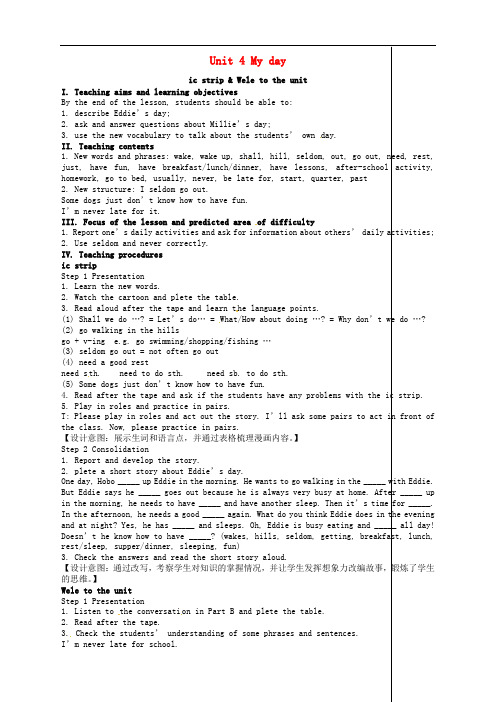
tudents’ own day.1. New words and phrases: wake, wake up, shall, hill, seldom, out, go out, need, rest, III. Focus of the lesson and predicted area3. Read aloud after the tape and learn t he language points.What/How about doing …? = Why don’t we do …? need se1. Listen to the conversati on in Part B and plete the table.start lessonsat a quarter past eightenjoy schoolT: OK, do you have any questions to ask me? “I’m never late for it.” Who can translate it into Chinese? What does “never” mean?4. Develop the conversation.【设计意图:通过书上提供的表格进行扩展练习。
】Step 2 Consolidation1. plete the passage, check the answers and read the passage aloud.T: OK, you really did a good job. Now are you clear abou t Millie’s daily activities? Please plete this short passage about Millie’s day.Millie is a hard-working student. She ______ up early in the morning. She goes to _______ at 7:20. She’s _______ late for school. Before the first lesson starts, Millie and all her classmates do morning ________. She has lunch at ten to ________. The school finishes at four ______ in the afternoon. Then it’s time for after-school ________. She always has fun. In the evening, Millie watches TV for ______ an hour. It’s her favourite time of the day. Then she needs to do her __________. She always does it carefully. She usually goes to _______ at 9:30.2. Report your day.(1) plete the table in the book abo ut the students’ own days.T: Now, I know something about Eddie’s and Millie’s days now. Next, I’d like to know about your day. Please write down the time and the activities in the table.(2) Practice reporting the students’ own da ys.T: OK, p lease try to report your day according to the table you finished just now. I’ll give you only two minutes to practice. Please try to make your report clear and interesting.(3) Ask a student to report and the other students to listen carefully.T: Time is up! Are you ready to report your day? When one student is telling about his or her day, the others should listen carefully. I will ask you questions after the report. Who’d like to be the first to tell us about your day?T: Thank … for your report. Now q uestions for the other students. Are you ready? Question 1 …【设计意图:让学生结合自己的实际情况练习,达到学以致用。
牛津译林版七年级上册Unit 4《My day》(第1课时)说课稿

牛津译林版七年级上册Unit 4《My day》(第1课时)说课稿一. 教材分析《牛津译林版七年级上册Unit 4 My day》是一篇以学生日常生活为背景的课文。
通过学习本课,学生可以掌握一般过去时的运用,学会如何描述自己的日常生活。
本课内容贴近学生生活,有利于激发学生的学习兴趣,提高学生的英语水平。
二. 学情分析七年级的学生已经掌握了基本的英语语法知识,具有一般现在时和一般过去时的初步认识。
但在实际运用中,学生对一般过去时的掌握还不够熟练,需要通过本课的学习进一步巩固。
此外,学生对英语写作和口语表达的欲望较强,为本课的教学提供了良好的基础。
三. 说教学目标1.知识目标:学生能够掌握一般过去时的基本结构,学会如何用英语描述自己的日常生活。
2.能力目标:学生能够熟练运用一般过去时进行口头和书面表达,提高英语交际能力。
3.情感目标:通过本课的学习,学生能够培养对英语的兴趣,增强自信心,提高自主学习能力。
四. 说教学重难点1.教学重点:学生能够掌握一般过去时的基本结构,学会如何用英语描述自己的日常生活。
2.教学难点:学生对一般过去时的运用,特别是在实际语境中的运用。
五. 说教学方法与手段本课采用任务型教学法,通过创设情境,引导学生参与课堂活动,提高学生的学习兴趣和积极性。
同时,运用多媒体教学手段,如图片、视频等,帮助学生更好地理解课文内容,提高课堂效果。
六. 说教学过程1.导入:以一幅描绘学生日常生活的图片引导学生思考,引出本课主题。
2.新课呈现:通过播放一段视频,让学生直观地感受一般过去时的运用,然后引导学生学习课文内容。
3.课堂活动:学生分组进行角色扮演,模拟课文中的场景,运用一般过去时进行交流。
4.写作练习:学生根据课堂所学,写一篇关于自己一天的日记,巩固一般过去时的运用。
5.口语展示:学生自愿上台展示自己的口头表达能力,其他学生进行评价。
6.课堂小结:教师总结本节课的学习内容,强调一般过去时的运用。
牛津译林版英语七上Unit 4《My day》(Grammar)教学设计

牛津译林版英语七上Unit 4《My day》(Grammar)教学设计一. 教材分析牛津译林版英语七上Unit 4《My day》主要讲述了一天中的日常活动。
本节课的主要内容包括一般过去时和一般现在时的区别以及如何运用这些时态来描述过去和现在的日常活动。
本节课的语言点是一般过去时和一般现在时的构成以及如何运用它们来构建句子。
教材通过丰富的语境和实用的日常对话,帮助学生理解和掌握这些语法知识。
二. 学情分析学生在学习本节课之前,已经掌握了一般现在时和一般过去时的基本知识,但可能对它们的运用还不够熟练。
此外,学生可能对一天中的日常活动有一定的了解,但需要通过课堂学习来进一步丰富和巩固这一知识体系。
因此,在教学过程中,教师需要关注学生的个体差异,因材施教,引导他们通过实践和交流来提高语言运用能力。
三. 教学目标1.知识目标:–能准确运用一般过去时和一般现在时描述自己的日常活动。
–理解一般过去时和一般现在时的区别,并能在适当的情境中运用。
2.能力目标:–能用英语进行简单的日常交流,提高口语表达能力。
–能通过听、说、读、写等多种方式,掌握和运用本节课的语言点。
3.情感目标:–培养学生对英语学习的兴趣,激发他们积极学习英语的激情。
–培养学生互相合作、积极交流的良好学习氛围。
四. 教学重难点•掌握一般过去时和一般现在时的构成和运用。
•学会用一般过去时和一般现在时描述自己的日常活动。
•一般过去时和一般现在时的区别及运用。
•如何在实际情境中灵活运用一般过去时和一般现在时。
五. 教学方法1.情境教学法:通过设定真实、生动的情境,让学生在实际语境中学习、运用英语。
2.交际法:引导学生进行互动交流,提高他们的口语表达能力和实际运用能力。
3.任务型教学法:通过完成各种任务,激发学生的学习兴趣,培养他们的合作精神。
4.游戏教学法:通过设计有趣的游戏,让学生在轻松愉快的氛围中学习英语。
六. 教学准备1.教学材料:教材、PPT、黑板、教学卡片、录音机等。
牛津译林版英语七上Unit 4《My day》(reading 1)教学设计

牛津译林版英语七上Unit 4《My day》(reading 1)教学设计一. 教材分析牛津译林版英语七上Unit 4《My day》(reading 1)主要介绍了主人公LiMing的日常生活。
通过描述他每天的活动,文章旨在帮助学生理解一般过去时的用法,并学会如何用英语描述过去的一天。
本课内容与学生的日常生活紧密相连,易于引起学生的兴趣和共鸣。
二. 学情分析七年级的学生已经掌握了基本的英语语法和词汇,具备一定的听说读写能力。
但他们在使用英语描述过去事件时,可能还存在一定的困难。
因此,在教学过程中,教师需要关注学生的个体差异,充分调动他们的积极性,引导他们正确运用一般过去时描述过去的事件。
三. 教学目标1.知识目标:–学会正确使用一般过去时描述过去的事件。
–掌握关键词汇和短语,如:go to school, have lunch, do homework等。
2.能力目标:–提高学生的阅读理解能力,能够理解并描述主人公Li Ming的日常生活。
–提高学生的口语表达和写作能力,能够用英语描述自己的日常生活。
3.情感目标:–培养学生对英语学习的兴趣,增强自信心。
–培养学生热爱生活,养成良好的生活习惯。
四. 教学重难点•一般过去时的用法。
•描述过去事件的表达方式。
•正确运用一般过去时描述过去的事件。
•灵活运用关键词汇和短语。
五. 教学方法1.情境教学法:通过设定生活情境,让学生在实际语境中学习并运用英语。
2.任务型教学法:通过完成各种任务,提高学生的阅读、口语和写作能力。
3.小组合作学习:培养学生团队合作精神,激发学习兴趣。
六. 教学准备1.教学材料:教材、多媒体课件、黑板、粉笔。
2.教学工具:投影仪、计算机、音响设备。
七. 教学过程1.导入(5分钟)教师通过提问方式引导学生回顾一般过去时的用法,如:“What did you do yesterday?”,激发学生的学习兴趣。
2.呈现(10分钟)教师播放课文录音,让学生初步感知文章内容。
七年级英语上册《Unit 4 My day Integrated skills》教案
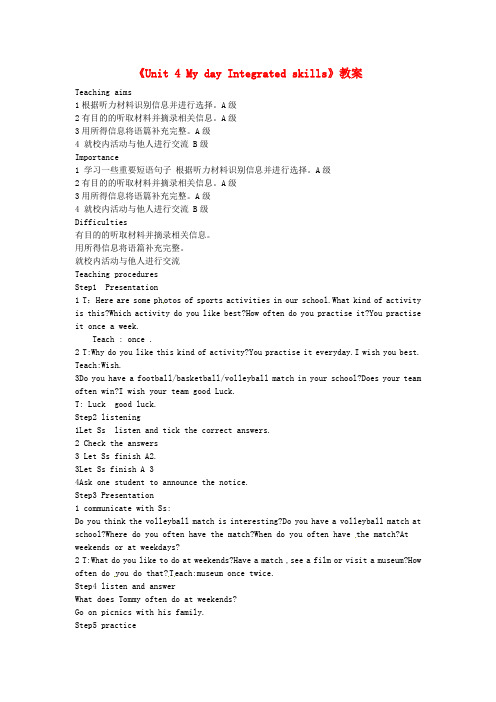
《Unit 4 My day Integrated skills》教案Teaching aims1根据听力材料识别信息并进行选择。
A级2有目的的听取材料并摘录相关信息。
A级3用所得信息将语篇补充完整。
A级4 就校内活动与他人进行交流 B级Importance1 学习一些重要短语句子根据听力材料识别信息并进行选择。
A级2有目的的听取材料并摘录相关信息。
A级3用所得信息将语篇补充完整。
A级4 就校内活动与他人进行交流 B级Difficulties有目的的听取材料并摘录相关信息。
用所得信息将语篇补充完整。
就校内活动与他人进行交流Teaching proceduresStep1 Presentation1 T:Here are some ph otos of sports activities in our school.What kind of activity is this?Which activity do you like best?How often do you practise it?You practise it once a week.Teach : once .2 T:Why do you like this kind of activity?You practise it everyday.I wish you best. Teach:Wish.3Do you have a football/basketball/volleyball match in your school?Does your team often win?I wish your team good Luck.T: Luck good luck.Step2 listening1Let Ss listen and tick the correct answers.2 Check the answers3 Let Ss finish A2.3Let Ss finish A 34Ask one student to announce the notice.Step3 Presentation1 communicate with Ss:Do you think the volleyball match is interesting?Do you have a volleyball match at school?Where do you often have the match?When do you often have the match?At weekends or at weekdays?2 T:What do you like to do at weekends?Have a match ,see a film or visit a museum?How often do you do that?T each:museum once twice.Step4 listen and answerWhat does Tommy often do at weekends?Go on picnics with his family.Step5 practiceLet Ss read after the tape.Read the dialogue in groupsAct out th e dialogueStep6 ActivityWork in pairs and make new conversations.分层效果检测题必做题A层一、根据句意及提示完成单词1.I like to go on a _________ (野餐)in the park in autumn.2.We’ll go to the ___________(博物馆) to see some old things this week.3.Students usually do after-school _____________ (activity)at 3 p.m..4.________ (祝愿) our team to win the match.5.My father goes to Beijing ________ (two)a year.6.Good ________(运气)with your English exam.二、用括号内所给单词的适当形式填空1.Mr. Wang (teach) us English .2.With the best (wish) to you.3.Everyone in our class (study) hard .4.Thank you for (give) me some bananas.5.Would you like (help) me with my English ?6.There two NBA basketball (match) on TV today.7.I think these (activity) are very (interest).选做题B层首字母填空Hi, I’m Liu Hua from Yancheng Middle School. I live n___1____the school. I w___2____to school every day. It takes me about ten m___3____.Let m___4____tell you something about my school library. We h___5____a big library. It’s open f___6____8:00 a.m. to 5:00 p.m.,but the reading room is o____7___ open in the afternoon. There are all k___8____ of books in our library. They are i___9____. Do you want to borrow books f__10____ it?1. ___________2. ___________3. ___________4. ___________5. ___________6. ___________7. ___________8. ___________9. ___________10. ___________。
2024年[初一英语]七年级英语上学期Unit4教案3
![2024年[初一英语]七年级英语上学期Unit4教案3](https://img.taocdn.com/s3/m/16be60ee1b37f111f18583d049649b6649d70978.png)
2024年[初一英语]七年级英语上学期Unit 4教案3一、教学内容本节课选自七年级英语上学期Unit 4《My day》,内容包括教材的Chapter 1和Chapter 2。
详细内容为:Chapter 1主要介绍了日常生活中的基本问候和自我介绍的表达方式;Chapter 2则围绕一天中不同时间段的活动展开,包括早晨、中午、下午和晚上。
二、教学目标1. 能够熟练运用日常问候和自我介绍的表达方式。
2. 能够描述一天中不同时间段的活动。
3. 提高学生的听说读写能力,培养他们合作学习和解决问题的能力。
三、教学难点与重点重点:日常问候、自我介绍的表达方式以及描述一天中的活动。
难点:正确运用时态描述不同时间段的活动。
四、教具与学具准备教具:多媒体设备、黑板、卡片等。
学具:课本、练习本、彩色笔等。
五、教学过程1. 导入:通过播放一段关于日常活动的视频,激发学生的学习兴趣,引导他们关注本节课的主题。
2. 知识讲解:a. 教师展示Chapter 1的内容,引导学生学习日常问候和自我介绍的表达方式。
b. 教师展示Chapter 2的内容,讲解如何描述一天中的活动。
3. 例题讲解:讲解教材中的例题,帮助学生理解和掌握所学知识。
4. 随堂练习:组织学生进行小组讨论,互相练习问候和自我介绍,然后进行全班展示。
5. 小组活动:让学生分组,根据教材中的提示,编写一段关于自己一天中的活动的对话,并进行展示。
六、板书设计1. 问候与自我介绍的表达方式。
2. 描述一天中的活动。
3. 时态运用。
七、作业设计1. 作业题目:根据本节课所学内容,编写一段关于自己一天中的活动的对话。
2. 答案:略。
八、课后反思及拓展延伸1. 反思:关注学生在课堂上的表现,针对他们的学习情况,调整教学方法和策略。
2. 拓展延伸:鼓励学生课后观察和记录自己及家人一天中的活动,用所学英语进行描述,提高他们的实际运用能力。
同时,推荐一些关于日常生活的英语阅读材料,拓宽学生的知识面。
牛津译林版七年级英语上册Unit4MyDay教案(20201203043057)
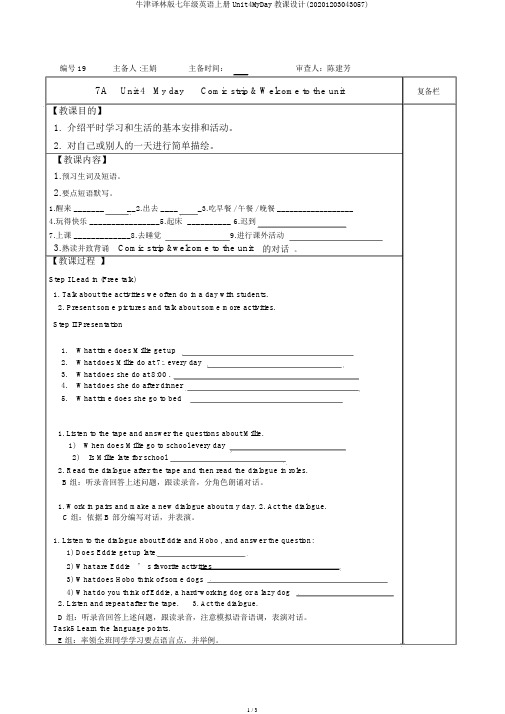
编号 19主备人 :王娟主备时间:审查人:陈建芳7A Unit 4 My day Comic strip & Welcome to the unit复备栏【教课目的】1.介绍平时学习和生活的基本安排和活动。
2.对自己或别人的一天进行简单描绘。
【教课内容】1.预习生词及短语。
2.要点短语默写。
1.醒来 _________2.出去 ____ 4.玩得快乐 ________________5.起床7.上课 _____________8.去睡觉_3.吃早餐 / 午餐 / 晚餐 __________________ __________ 6.迟到9.进行课外活动3.熟读并致背诵Comic strip &welcome to the unit的对话。
【教课过程】Step I Lead in (Free talk)1.Talk about the activities we often do in a day with students.2.Present some pictures and talk about some more activities.Step II Presentation1.What time does Millie get up2.What does Millie do at 7:. every day3.What does she do at 8:00 .4.What does she do after dinner5.What time does she go to bed1.Listen to the tape and answer the questions about Millie.1)When does Millie go to school every day2)Is Millie late for school2.Read the dialogue after the tape and then read the dialogue in roles.B 组:听录音回答上述问题,跟读录音,分角色朗诵对话。
七年级英语上册 Unit 4《My day》(Reading 1)教案 (新版)牛津版

Unit 4 My dayTeaching aims and demands:1.Learn Millie’s school life and grasp the main words 、phrases .2.Learn how to describe one’s school life and practice reading skills .3.Love our school , love our life .Step 1. Lead-inPlay a short video about our school life , let students say some words or phrases about it . The teacher shows some pictures to students to sum up the activities they often do at school . And teach some new words .Step 2. Presentation1.The teacher says : I think our school life is interesting and colorful . What about Millie’s school life ? Do you want to know ? Millie writes an email to her new online friend Tommy . In her email , we’ll know her school .Step 3. Listen and answer1.)What is Millie’s favourite subject?2.)Is she good at it ?Step 4. Read the email quietly then finish Part B1 on Page 45Students check the answers like this :A:When do they do morning exercises ?B:They do morning exercises at eight .Step 5. Careful Reading1.Read Paragraph 1 & 2 carefully , then ask and answer.1.) What’s the name of Millie’s school?2.)Does she love her school ?3.) What do they do first in the morning ?2.Read Paragraph 3、4 & 5,then judge T or F.1.)Millie seldom chats with her friends after class.2.)Millie only goes to the Reading Club on Tuesday.3.)Millie is a member of the school swimming team.Step 6. Play a gameStep 7. PracticeComplete Millie's school life .(方框选词填空)in the afternoon, have a good time, chat with,play in the playground, practise, nice ,start,Millie is a new student at Sunshine Middle School . Her school ________at 8:00in the morning . Millie has a lot of friends at School . They are all ______ toher . After class , they often _____________ each other or _____________________. Sometime she goes to the library________________. She often reads books in the Reading Club . She also likes playingvolleyball. She is a member of the school volleyball team.She ___________ afterschool on Wednesday afternoon . She always_______________ at her school.Step 8. ConsolidationGroup work: Can you talk about your school life .Student1 : School and lessonsStudent2 : Friends at schoolStudent3 : HobbiesStudent4 : After-school activitiesStudent5 : FeelingStep 9. Watch and discuss1.)What's the differences between our school and theirs ?2.)What do you think of their school life ?3.)What should we do ?Step 10. Homework1.Read and recite Millie’s email.2. Write something about your school life in English and then talk about it withyour classmates.【课后拓展】阅读理解:Hi. I’m LingLing. I’m a studen t at No. 14 Secondary School. Do you want to knowmy life? Let me tell you about it. I usually get up at 7:00 in the morning. I have my breakfast at 7:10. My parents always prepare(准备)the breakfast for me. I go to school at 7:30. We have 7 lessons every day f rom Monday to Friday. I like English lesson very much. After school, I like playing ping-pong and basketball with my friends. There is a very big playground in our school.( )1. I have my br eakfast at ______.A. 7:00B. 7:10C. 7:30D.7:20( )2. I have seven lessons ____.A. every dayB. at the weekendC. five days a weekD. twice a week( )3. I like ______ very much.A. EnglishB. ChineseC. art lessonD. all lessons( )4. There is a big ______ in No. 14 Secondary School.A. gardenB. libraryC. playgroundD. computer room( )5. I li ke playing ______ with my friends.A. ping-pong and basketballB. footballC. football and basketballD. basketball。
最新牛津译林版中学七年级英语上册《Unit 4 My day Grammar》教案
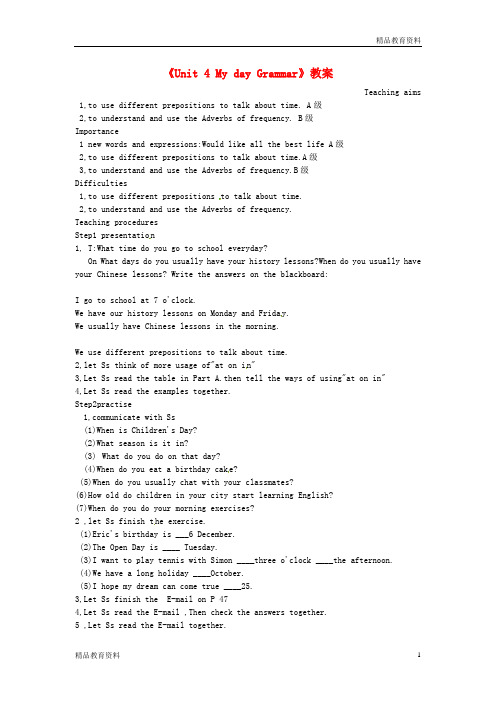
《Unit 4 My day Grammar》教案Teaching aims 1,to use different prepositions to talk about time. A级2,to understand and use the Adverbs of frequency. B级Importance1 new words and expressions:Would like all the best life A级2,to use different prepositions to talk about time.A级3,to understand and use the Adverbs of frequency.B级Difficulties1,to use different prepositions to talk about time.2,to understand and use the Adverbs of frequency.Teaching proceduresStep1 presentatio n1, T:What time do you go to school everyday?On What days do you usually have your history lessons?When do you usually have your Chinese lessons? Write the answers on the blackboard:I go to school at 7 o'clock.We have our history lessons on Monday and Frida y.We usually have Chinese lessons in the morning.We use different prepositions to talk about time.2,let Ss think of more usage of"at on i n"3,Let Ss read the table in Part A.then tell the ways of using"at on in"4,Let Ss read the examples together.Step2practise1,communicate with Ss(1)When is Children's Day?(2)What season is it in?(3) What do you do on that day?(4)When do you eat a birthday cak e?(5)When do you usually chat with your classmates?(6)How old do children in your city start learning English?(7)When do you do your morning exercises?2 ,let Ss finish t he exercise.(1)Eric's birthday is ___6 December.(2)The Open Day is ____ Tuesday.(3)I want to play tennis with Simon ____three o'clock ____the afternoon.(4)We have a long holiday ____October.(5)I hope my dream can come true ____25.3,Let Ss finish the E-mail on P 474,Let Ss read the E-mail ,Then check the answers together.5 ,Let Ss read the E-mail together.S tep3 presentation1 Communicate with SsT:Tommy and Millie often chat with each other on the internet.Do you often chat on the Internet?How often do you write e-mails?S:...T:Oh, you chat with your friends on the internet everyday.So you always chat with your friends...\T:Adverbs of frequency tell you how often things happen.2.Let Ss read the picture of Part B ,and work out the rul e:Always-usually-often-sometimes-seldom-neverStep4 practiceLet Ss finish the exercise on P 48Let Ss read it together .and remind them of the adverbs .Step5 ActivityI'll give you some minutes to prepare the conversation about your own day.You can talk about your school day and your daily activities.Pay attention to use the correct prepositions of time and adverbs of frequency.分层效果检测题必做题A层一、用on, in和at填空。
- 1、下载文档前请自行甄别文档内容的完整性,平台不提供额外的编辑、内容补充、找答案等附加服务。
- 2、"仅部分预览"的文档,不可在线预览部分如存在完整性等问题,可反馈申请退款(可完整预览的文档不适用该条件!)。
- 3、如文档侵犯您的权益,请联系客服反馈,我们会尽快为您处理(人工客服工作时间:9:00-18:30)。
Teaching aims1.To learn words and phrases: A级first each other practise chat with best wishes2. To understand the text and talk about school life in English. A级3 To talk about your own school B级ImportanceWords and phrases study. A级Text understanding. A级To talk about school life and school activities.B级Teaching proceduresStep1 free talkFree talkStep2Lead inT:I love our school very much.From Monday to Friday,I am never late for school.In the morning, I usually clean my office first.After school,I like to do after-school activities with my students.Sometimes I chat with them.They tell me a lot of interesting things.All of us have a good time at school.Teach new words:from..to.. First chat with have a good time.T: Do you have any sports at school?When do you have sports?Do you want to be the best player?I think you should practise hard.I wish you success.Teach: practise and wish.Step3 practiceTalk about the time table.We go to school from...to..Our school starts at...We have lessons..After class,....chat with ....practice.....have a good time..Step4 presentationI.T:Millie writes to her online friend TommyAsk students to listen to the tape without looking at the books, then answer the question:What Team is Millie in?(Volleyball team)2 read and to to find the answer:What does Millie do at school?3listen to the tape again and finish PartB1Step 5 Practice1 Read Millie's e mail after the tape.2 Divide the class into five groups, Each group read one paragraph.3 finish exercise B2Step6 Activity1).Work in pairs.Ask and answer about Millie's school life.1 On what days does Millie go to school in a week?2 When does their school start?3 What do they do first at school?4What lesson does Millie like at school?5 When do Millie and her friends play in the playground?6 Where does Millie sometimes go in the afternoon?7When does Millie practise volleyball?2).Students in roleWho wants to be Millie ans answer the other's questions?Eg:How do you go to school everyday?Where do you have lunch?How many clubs do you have in your school?Homework分层效果检测题必做题A层根据句意及提示完成单词1. I like ____ (chat)with my mother.2. We practise ________(swim) every Tuesday.3. Please give my best__________(祝愿) to your parents.4. This is our _ (one)day in Japan.5. F_____________ is the sixth day of a week.6. How many ______________ (图书馆) are there in your school?7. We do morning ___________(exercise) at a quarter past eight every day. 根据汉语完成句子1.英语是我最喜欢的科目。
English is .2.从周一到周五Tommy从不看电视。
Tommy TV Monday Friday.3.我们每天都要做早操和课外活动。
4.We and every day.5.我们下课后经常互相聊天或在操场上玩。
We often or playAfter class.3. 在生日聚会我们玩得十分xx心。
We ______ ______ _______ ________ at the birthday party.4. 在学校,老师们对我非常好。
My teachers ______ ______ ______ me at school.7. 他们在八点钟xx始上课。
They _____ _______ ______ _______ at 8:00.选做题B层根据文意及首字母提示补全短文Mr Smith is a teacher of English. He comes from New York, A ____1 . He teaches English in China. He s 2 _ Chinese very well.He reads a lot of books and his wife often writes books f 3 the students at home. Mr Smith gets up at five in the m 4 . He leaves home at ten to six. He beginshis lesson at 8:00. He teaches English every day e__ 5 _ Saturday and Sunday. At ten to twelve he finishes his lessons. Ten minutes l_ 6 , he has lunch. In the afternoon, he usually plays g 7 __ with his students. S 8 he teaches his students in his office. After school, he takes a walk and does some o 9 things. At a 10 ten to eleven, he goes to bed.1.____________2._____________3._____________4.______________5._____________6.____________7.______________8._____________9.______________ 10.____________Teaching aims1.To learn words and phrases: A级first each other practise chat with best wishes2. To understand the text and talk about school life in English.B级ImportanceWords and phrases study. A级Text understanding. A级To talk about school life and school activities. B级Teaching proceduresStep1presentationLook at the pictures.They are all about Millie's school life.Can you introduce the activities?Can you arrange them in the time order?Step2 language points1 first2 chat with each other3 from..to..4 have a good time5 practise6 wishStep3 Practice1 Complete the conversation in part B3.2 Boys play the role of Tommy,Girls play the role of Joan,Read theconversation.3 Ask Ss to role play the conversation.Step4 ActivityDo you think Millie's school life is interesting?What about your school life?Can you say something about your day?Please look at the notes in PartC Write about your day.Introduce your own day in your groupHomework分层效果检测题必做题A层复习四会单词、重要句型后,默写下列短语并用红笔批改订正。
